|
|
|
Sort Order |
|
|
|
Items / Page
|
|
|
|
|
|
|
| Srl | Item |
| 1 |
ID:
174644
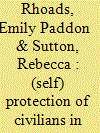

|
|
|
|
|
| Summary/Abstract |
Over the past decade, a body of scholarship on civilian self-protection (CSP) has emerged, advancing understandings of civilian agency in war. In this article, we argue that CSP has been conceptualized in a narrow manner, reflecting the nascent status of the field. Scholars have focused on responses to threats directly related to the dynamics of conflict, physical in nature, and caused by the presence of armed groups. Using the case study of the Protection of Civilians (PoC) sites in South Sudan and drawing on over 150 interviews, we identify one type of protective response neglected in the literature: community and popular justice. Although the PoC sites provide a measure of protection, residents face a range of daily threats that are indirectly related to the conflict, such as crime. In this context, community justice emerged as a natural response, an overlooked yet vital form of CSP that addresses immediate protection needs and fulfills a social ordering function. By conceiving of justice in this way, this article aims to deepen understanding of civilian agency and start a conversation with scholars and practitioners about the boundaries of (self) protection.
|
|
|
|
|
|
|
|
|
|
|
|
|
|
|
|
| 2 |
ID:
126750
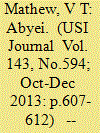

|
|
|
| 3 |
ID:
160028
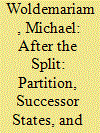

|
|
|
|
|
| Summary/Abstract |
Why do partitioned successor states engage one another in armed conflict? We explore the drivers of war between successor states by comparing two border crises that followed the partitions of Ethiopia (1993) and Sudan (2011). We argue that the politico-military struggles that give way to partition create important historical memories that shape what successor states think about the utility of military force. While the partition of Ethiopia yielded successor states led by regimes that were victors of the preceding war of partition, the war of partition in Sudan produced successor states that emerged out of military stalemate. This distinction explains why Ethiopia and Eritrea waged a costly border war that Sudan and South Sudan were able to avoid.
|
|
|
|
|
|
|
|
|
|
|
|
|
|
|
|
| 4 |
ID:
163353
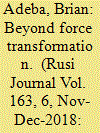

|
|
|
|
|
| Summary/Abstract |
South Sudan’s decade-old defence policy is dated. In this article, Brian Adeba argues that a new defence policy which is tethered to a national security framework that accounts for evolving security challenges and addresses missed opportunities for professionalising the Sudan People’s Liberation Army is necessary.
|
|
|
|
|
|
|
|
|
|
|
|
|
|
|
|
| 5 |
ID:
111250
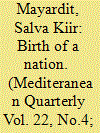

|
|
|
|
|
| Publication |
2011.
|
| Summary/Abstract |
This essay reflects the guiding principles, laid out by one of its architects, of the new nation of South Sudan - a nation that assumed its place in the world community on 9 July 2011.
|
|
|
|
|
|
|
|
|
|
|
|
|
|
|
|
| 6 |
ID:
133253
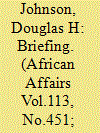

|
|
|
|
|
| Publication |
2014.
|
| Summary/Abstract |
ON 16 DECEMBER 2013 THE PRESIDENT of the Republic of South Sudan, Salva Kiir Mayardit, appeared on state television in military uniform to announce that he had successfully put down a coup attempt in the capital, Juba. The coup attempt was said to have been led by former Vice-President Riek Machar and several ex-cabinet ministers and officials of the ruling Sudan People's Liberation Movement (SPLM), including Madame Rebecca Nyanding de Mabior, the widow of the SPLM's first leader, John Garang. Eleven alleged coup plotters were arrested in their homes, but Riek Machar escaped from Juba, and, amid reports over the next few days of targeted killings of Nuer in Juba by men in uniform loyal to the President, the commanders of the 8th and 4th army divisions of the Sudan People's Liberation Army (SPLA) in Jonglei and Unity states announced their defection to Riek Machar and seized control of the state capitals of Bor and Bentiu. In telephone interviews from secure places Riek Machar denied that he had been involved in a coup but then urged the army to overthrow Salva Kiir and announced his plans to march on Juba.
|
|
|
|
|
|
|
|
|
|
|
|
|
|
|
|
| 7 |
ID:
120221
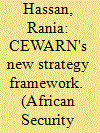

|
|
|
|
|
| Publication |
2013.
|
| Summary/Abstract |
A decade after establishing the Conflict Early Warning and Response Mechanism (CEWARN) of the Intergovernmental Authority on Development (IGAD), the member states endorsed the new strategy framework that is to guide the work of CEWARN until 2019. Although the original legal foundation upon which CEWARN was founded did not specify the types of conflicts that it could be involved in, CEWARN chose to limit itself to cross-border pastoral conflicts. This was partially due to the low levels of confidence between the member states, which prevented CEWARN from engaging in other types of conflicts that are considered to be more 'political' and thus more 'sensitive'. The hope was that after asserting its own success in dealing with cross-border pastoral conflicts, CEWARN would be able to expand its geographical as well as thematic scope. Thus, the most pronounced aspect of the new strategy framework is the expansion of CEWARN operations beyond their current limited focus. Although it is too early to assess the new strategy framework, I attempt to provide a reading of the future of this strategy plan, with particular reference to Sudan and South Sudan. I argue that despite the rhetoric that accompanied the endorsement of the new strategy, the prospects of the new plan in Sudan and South Sudan depend on a number of factors: first, enhancing the mutual trust between Sudan and South Sudan with regard to exchange of information; second, changing Sudan's perceptions with regard to IGAD; and third, securing the much-needed funding for such an expansion of CEWARN's work.
|
|
|
|
|
|
|
|
|
|
|
|
|
|
|
|
| 8 |
ID:
133855
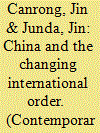

|
|
|
|
|
| Publication |
2014.
|
| Summary/Abstract |
From the beginning of 2014, the international order has undergone some quite dramatic changes in several parts of the world. The Ukrainian political crisis has gradually evolved into a U.S-Russia confrontation two decades after the end of cold war. In the Middle East, the extremist group, the Islamic State of Iraq and Al Sham (ISIS) invaded Iraq gaining much territory in the north of the country. Iraq has become a new unstable element in the Middle East. In Africa, the aftershock of the Arab Spring can be seen most prominently in Egypt and Libya. South Sudan and Central Africa are plagued by civil war. In the Asia-Pacific region Sino-Vietnam and Sino-Japanese Conflict have escalated and Japan has lifted a ban on collective self defence which threaten China's neighborhood security and regional stability.
|
|
|
|
|
|
|
|
|
|
|
|
|
|
|
|
| 9 |
ID:
117788
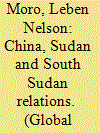

|
|
|
| 10 |
ID:
117783


|
|
|
| 11 |
ID:
117785
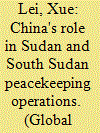

|
|
|
| 12 |
ID:
120047
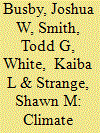

|
|
|
|
|
| Publication |
2013.
|
| Summary/Abstract |
Many experts argue that climate change will exacerbate the severity and number of extreme weather events. Such climate-related hazards will be important security concerns and sources of vulnerability in the future regardless of whether they contribute to conflict. This will be particularly true where these hazards put large numbers of people at risk of death, requiring the diversion of either domestic or foreign military assets to provide humanitarian relief. Vulnerability to extreme weather, however, is only partially a function of physical exposure. Poor, marginalized communities that lack access to infrastructure and services, that have minimal education and poor health care, and that exist in countries with poor governance are likely to be among the most vulnerable. Given its dependence on rainfed agriculture and its low adaptive capacity, Africa is thought to be among the most vulnerable continents to climate change. That vulnerability, however, is not uniformly distributed. Indicators of vulnerability within Africa include the historic incidence of climate-related hazards, population density, household and community resilience, and governance and political violence. Among the places in Africa most vulnerable to the security consequences of climate change are parts of the Democratic Republic of the Congo, Guinea, Sierra Leone, Somalia, and South Sudan.
|
|
|
|
|
|
|
|
|
|
|
|
|
|
|
|
| 13 |
ID:
111538
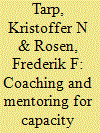

|
|
|
|
|
| Publication |
2012.
|
| Summary/Abstract |
Coaching and mentoring for capacity' is becoming increasingly important in the state-building toolbox. If executed properly, this instrument is believed to be significantly more effective than traditional technical assistance and would consequently seem to hold great promise for the state- and peacebuilding agenda. The latest offshoot of this development is the Initiative for Capacity Enhancement in South Sudan. The initiative seeks to enhance the capacity of the South Sudanese state apparatus by deploying civil servants from neighbouring nations to coach their South Sudanese counterparts. This paper explores this particular initiative with the aim of identifying insights about designing coaching and mentoring programmes for capacity development.
|
|
|
|
|
|
|
|
|
|
|
|
|
|
|
|
| 14 |
ID:
140318
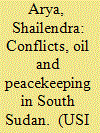

|
|
|
| 15 |
ID:
145957
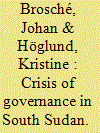

|
|
|
|
|
| Summary/Abstract |
Since mid-December 2013, thousands of people have been killed in armed conflict in South Sudan. The fighting is entrenched in a power struggle between the main political contenders ahead of elections which were scheduled for 2015. This article examines the violence in South Sudan since the North–South war ended with a focus on the consequences of the introduction of electoral politics. Our research contributes to the literature on state-building and peace-building in war-torn societies, by exploring how the extreme levels of violence are linked to three groups of factors. First, the stakes involved in being part of the government are extremely high, since it is the only way to secure political and economic influence. Second, the actors involved in political life are dominated by individuals who held positions within the rebel groups, which increases the risk of political differences turning violent. Third, the institutions important for a legitimate electoral process, and which work to prevent violence, are weak or non-existent.
|
|
|
|
|
|
|
|
|
|
|
|
|
|
|
|
| 16 |
ID:
158629
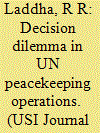

|
|
|
| 17 |
ID:
127752
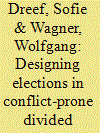

|
|
|
|
|
| Publication |
Frankfurt, Peace Research Institute frankfurt, 2013.
|
| Description |
37p.Pbk
|
| Series |
PRIF Report no.122
|
| Standard Number |
9783942532570
|
|
|
|
|
|
|
|
|
|
|
|
Copies: C:1/I:0,R:0,Q:0
Circulation
| Accession# | Call# | Current Location | Status | Policy | Location |
| 057578 | 324.609629/DRE 057578 | Main | On Shelf | General | |
|
|
|
|
| 18 |
ID:
117787


|
|
|
| 19 |
ID:
125956
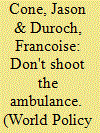

|
|
|
|
|
| Publication |
2013.
|
| Summary/Abstract |
LANKIEN, South Sudan-The wounded started arriving in the evening. A rusted-out pick-up truck dropped off four young men with gunshot wounds, two with life-threatening wounds to the abdomen and the others with leg injuries, at the 100-bed Médecins Sans Frontières (MSF) hospital here. Just hours earlier, the hospital's team and local residents had been playing volleyball as the sun began to set on a 106-degree day.
|
|
|
|
|
|
|
|
|
|
|
|
|
|
|
|
| 20 |
ID:
151712
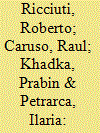

|
|
|
|
|
| Summary/Abstract |
This paper investigates the effect of the deployment of United Nations Blue Helmets on economic activity in South Sudan with a special focus on agricultural production. Since UN troops are predicted to improve security, in particular, we expect a positive relationship between deployment of UN blue Helmets and cereal production. We test our hypothesis using an original data-set including all the 78 South Sudanese counties over the period 2009–2011. We control for the non-random assignment of UN troops through an Instrumental Variables approach. Our empirical results show that a 10% increase in the size of the troop allows the production of additional 600 tonnes.
|
|
|
|
|
|
|
|
|
|
|
|
|
|
|
|
|
|
|
|
|